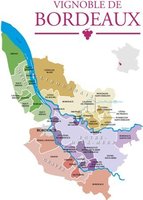organic wine, biodynamic wine, Demeter wine, na... Our organic wines Organic wine France Organic wine Bordeaux, Medoc, Saint Emilion, Po...
Organic wine Bordeaux, Medoc, Saint Emilion, Pomerol, Côtes de Bourg

The name Bordeaux derives from its location "on the edge of the waters" of the Gironde estuary, in French « au bord des eaux ».
Organic wines from Bordeaux are produced by more and more wineries. Out of around 3,000 Château, as one calls wineries in Bordeaux, around 600 Château produce Bordeaux organic wines. We try to support this development and are looking for courageous customers for our organic wines from Bordeaux who do not believe in the prejudice that they are too expensive. Convince yourself of the value for money and the high quality of our range, which consists of normal Bordeaux AOC/AOP wine, Bordeaux Superieur AOC/AOP, Côtes de Bourg AOC, Côtes de Blaye AOC, Lalande de Pomerol AOC, Pomerol AOC, Saint Emilion AOC and Medoc AOC in the price range from € 8.00 to € 50.00.
If you have prejudices against wine from Bordeaux, for example they are too expensive, then I advise you to differentiate and compare. Very decent organic wines for everyday enjoyment are available from about 10 euros, for 15 - 25 euros there are already very good organic wines from the appellation Saint Emilion, LaLande de Pomerol or from the Medoc. There are now also Grand Cru organic wines that cost 200 to 400 €/bottle and the price is not in good proportion to the quality and the effort involved in producing it.
Another prejudice, that Bordeaux wines can only be enjoyed after more than 10 years of aging, is generally no longer true today. Today, Bordeaux wines no longer macerate and ferment with the vines for 6 weeks to extract as many tannins as possible. The changed climate has also led to riper, less acidic grapes and thus to milder, softer and full-bodied organic wines. In addition, an uninterrupted trend towards environmentally friendly viticulture and organic wine production has been observed for several years. So there is a lot to be said for buying organic wine from Bordeaux.
Grape varieties for red Bordeaux wines, including organic wines
AOP (Appellation d'Origine Protégée) formerly AOC (Appellation d'Origine Contrôlée) in German, quality wine with controlled designation of origin):
- Merlot (main grape variety, obligatory)
- Cabernet Sauvignon (main grape variety, obligatory)
- Cabernet Franc (main variety, obligatory)
- Petit Verdot (secondary grape variety)
- Malbec (secondary grape variety)
- Carménère (secondary variety)
Grape varieties for white Bordeaux wines, including organic wines
- Sémilion (main grape variety, obligatory)
- Sauvignon Blanc (main grape variety, obligatory)
- Muscatelle (main variety, obligatory)
- Colombard (secondary grape variety)
- Merlot Blanc (secondary grape variety)
- Sauvignon Gris (secondary grape variety)
- Ugni Blanc (secondary grape variety)
All Bordeaux wines and all Bordeaux organic wines consist of a cuvée with
at least two grape varieties that ideally complement and harmonize each other.
IIt is questionable whether these grape varieties, which have adapted to the cooler climate in the region around Bordeaux for many decades, can be retained. Because it is to be feared that as temperatures continue to rise, the typical elegant character of Bordeaux wines could be lost and their alcohol content could rise sharply. Higher temperatures and more intense solar radiation cause an increasing CO2 content in the atmosphere, which leads to stronger growth of the vines. Not only is more organic material formed (stronger vines, increased leaf growth, higher yields), which is positive from an economic point of view. However, the shorter growth and ripening phases caused by the improved photosynthesis, which leads to higher sugar levels and lower acidity in the grapes, are undesirable. As a result, the desired and important balance between sugar and acidity is lost. It could lead to heavy, clumsy and high-alcohol organic Bordeaux wine that might be indistinguishable from wines made from
sunnier wine-growing regions. Tests are already underway in Bordeaux with alternative grape varieties that produce less sugar, including new breeds
Vines are already underway. Some organic wine estates are already planting fruit trees in the vineyards and on the edges, as well as hedges and shrubs to provide shade and temperature control.
New Château Mazeyres, Pomerol AOC, biodynamic wine, from € 33,60Product no.: 0452Fonroque is distinguished by Alain Moueix, an agricultural engineer and oenologist who emphasizes biological intelligence and biodynamics.
1 l = 45.33 €
Delivery period 1-3 days |
New Château Pontet Canet, Pauillac, 5ème Grand Cru Classé biodynamic, from € 114.60Product no.: 0453The biodynamic wine from Pontet Canet has been the shooting star from Pauillac in the Médoc for 10 years, and now also with us.
1 l = 153.33 €
Delivery period 1-3 days |
New Château Haut Bages Liberal Pauillac,5eme Grand Cru Classé, biodyn. € 39.60Product no.: 0454It seems that women like Caroline Frey had to lead the "big" château in the Médoc into a more environmentally conscious future.
1 l = 53.33 €
Delivery period 1-3 days |
New Château Fonroque, Saint Emilion Grand Cru Classé, biodynamic wine, from € 41.60Product no.: 0455Fonroque is distinguished by Alain Moueix, an agricultural engineer and oenologist who emphasizes biological intelligence and biodynamics.
1 l = 56.00 €
Delivery period 1-3 days |
| 31 - 34 of 34 results |
|
![Biowein [pur] Hartl - organic wine shipper](/WebRoot/Store7/Shops/87b180e2-5584-4f7d-8168-acd5dfe63e0b/Styles/Sharp[3]/logo.png)







